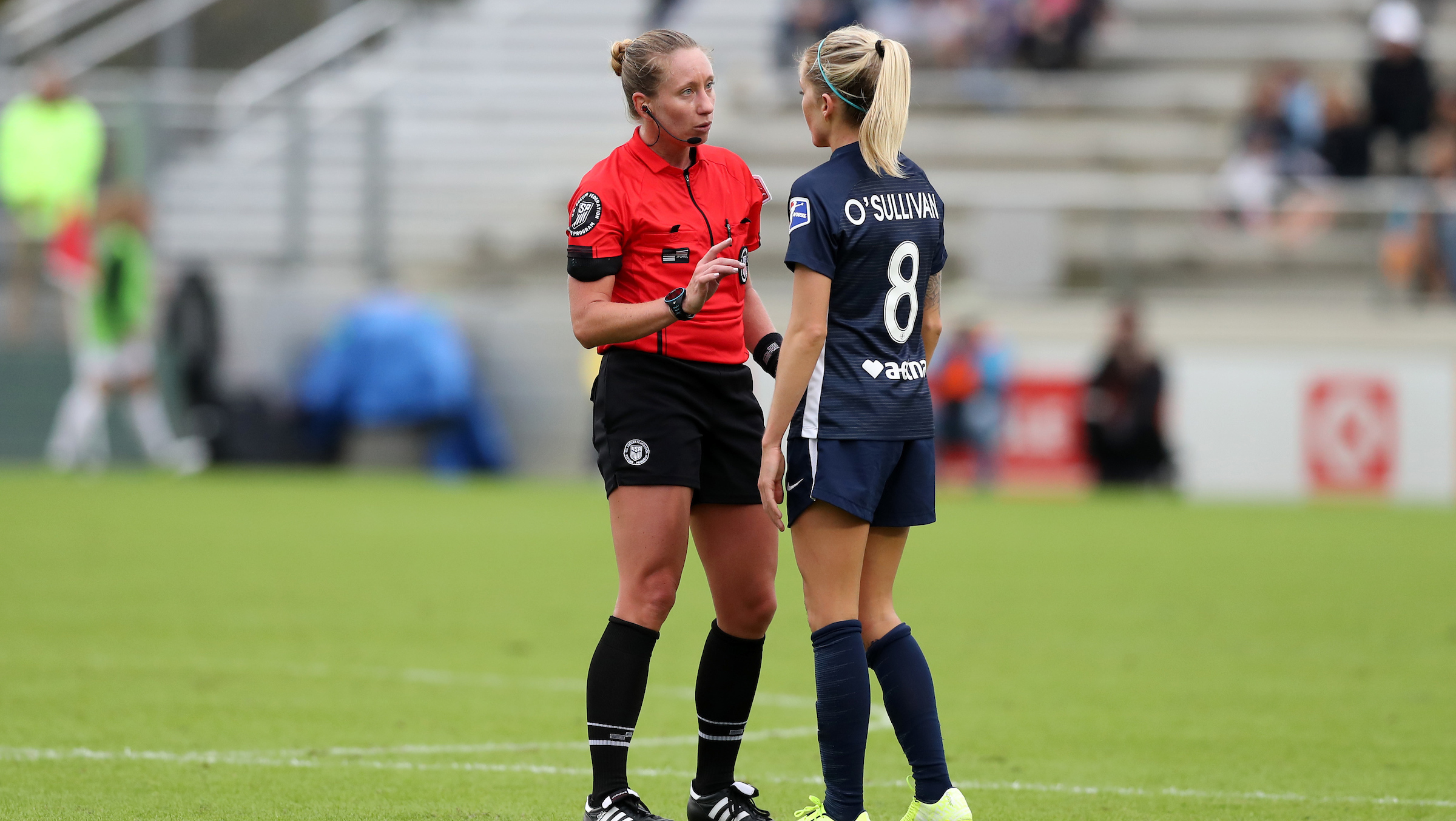Five tips on how to properly handle conflict as a soccer Referee

By Adam Schwager
SoccerWire Contributor and Certified Referee
Last week, we covered an incident where a referee completely mishandled a post-match conflict after a Labor Day tournament game, degrading his own integrity by relying on personal, racially-based attacks.
While the incident in question stands on its own as an extreme example of what not to do when handling conflict with coaches or parents, I find that referees – especially ones that are newer to the officiating world – could often use some general tips and refreshers on how to properly talk to a coach who’s dissatisfied with your on-the-field performance.
Here’s SoccerWire’s top five tips on how to approach conflict as a referee.
Be Polite and Be Calm
It’s human nature for coaches and parents to defend their team from what they feel is an injustice. However, it’s your job as a referee to manage not only the players, but the coaches and even unruly parents as well.
If a coach or player gets extremely heated over a call, the best response for a referee is to have a brief, calm discussion about how you saw the play and why you called it in that manner.
Do not match a coach’s level of aggression by yelling back at them, which does nothing to remedy the situation, and will most likely escalate the conflict.
Remember, if a coach is being especially hostile, you always have the right to walk away. While this method does not work 100% of the time, it is exponentially more effective than responding to aggression with more aggression. It puts the onus on the coach to calm down, or else they are susceptible to being on the wrong side of one of your cards.
Kindly Assert Your Dominance
This is an incredible tip for younger, less experienced referees, and one that I wish I had known when I took the pitch for the first time at the age of 16.
It can be incredibly difficult to have thick skin and stand up for yourself when you’re only a teenager being yelled at by an adult coach. However, it’s important to remember that you are the certified referee in the situation, and it’s your job to call the game, not theirs. You were the one who went through the training and you are the one who has been studying up on the Laws of the Game.
It’s OK to remind the coach of that fact.
You are also the one who possesses the cards and has the ability to send the coach off for repeated abusive behavior, and you may want to (calmly) remind the coach of that as well. Even if you’ve never played a game of organized soccer in your life and just got your certifications last week, you have been assigned to referee the match – not the coach and certainly not the parents.
Be Honest
As a referee, you’re only human. You will make mistakes, and you will miss calls. If a coach gets mad at you for a call you didn’t or couldn’t see, it’s OK to tell them that. This happens often on controversial bang-bang throw-in calls, where both you and your assistant referee are unclear about who touched the ball last. You can to tell the coach:“It’s a very close play and I’m using my best judgement.”
While being confident in your calls is certainly important, you’ll never lose credibility with a coach faster than doubling-down on a wrong call where the coach had a much better angle at the play than you.
In the same vein, you can’t call something you or your assistant referee didn’t see. If a coach is complaining about a non-call behind the play, confer with your assistant at an appropriate stoppage to see if he saw what the coach is complaining about. This shows that you’re taking the complaint seriously, and that you’re dedicated to getting the calls correct for both teams on the pitch. Tell the coach that you and your assistant will keep an eye out for similar infractions the remainder of the game.
While the coach may get frustrated with you, they at least know that you’re trying, and will encourage them to approach you in a gentler manner for the remainder of the game.
Be Proactive
The minute you make a call, don’t be afraid to be vocal about your rationale for making your call. Shouting things like “If that was shoulder-to-shoulder I would’ve let that go, but once you got your hands involved I had to make the call,” or “I know you were making a play for the ball, but you kicked his feet out from under him so I had to call that,” can go a long way in building credibility for yourself before a coach decides to get in your face.
It’s your job to let the coaches know that you’re just out there doing the job to the best of your ability, and vocalizing the thought process behind your decisions is the most effective way to do this.
Utilize Your Crew
There are three teams on the field in every game: the two teams that are competing against each other, and the referee team. We all wear the same uniform and colors for a reason, we’re a team too!
This is especially true during pregame, halftime and postgame. When talking to a coach at halftime or after the game, make sure you have your team with you, to back you up. The same advice goes for when it’s your turn to run lines; stand up for your center referee and stand with them when they’re talking to a coach.
Even if you disagree with your center’s calls (which I have plenty of times), don’t go telling the coach “I don’t know if I would’ve made that call.” While constructive criticism is encouraged among referees when there’s no coaches around, openly questioning the calls of your center will only make his, and by extension your, job harder.
Finally, when the game is over, leave the field together and don’t leave your crew until the last possible moment. A hostile parent is much less likely to approach a team of three referees than they are a single, isolated referee. Your trip from the field to your car is the most vulnerable time for a referee, so don’t make yourself more vulnerable by ditching your teammates to get out of there as soon as possible!
Last Resort
Hopefully, if you religiously follow these five tips, you’ll be able to mitigate any potential conflicts you have with a coach, parent or player.
However, even if you do everything right, you’re still bound to get angry coaches or parents in your games. It comes with the territory of being a referee. While helping coaches to see your point-of-view should work in most cases, you’re always bound to get one to two coaches a month who are just unbearable.
If you’ve exhausted all other options and the situation is still spiraling out of control, you have cards and you can and should use them. To start the 2019-20 season, IFAB introduced a new law that allows referees to card team officials for the first time. Previously, only players and substitutes were allowed to receive cards. Nothing makes a coach stop running his mouth faster than popping out your yellow and telling the coach that it’s their last warning or else they’ll be watching from the parking lot.
Remember, your job is to officiate a game, not get verbally abused for 90 minutes.
SOCCERWIRE MARKETPLACE
- Girls College ID Soccer Camp – Showcase Your Skills!
- Real Colorado Cup 2026
- Join a College Coaches Showcase Camp Today
- MICFootball Punta Cana 2026
- Dana Cup Hjørring 2026
- 15th Annual Loudoun Soccer College Showcase
- OFFICIAL FC BARCELONA SOCCER CAMPS - PROMO CODE: FCBSOCCERWIRE
- New England Copa Surf 2026
- Adidas National Cup 2026
- visitRaleigh.com Showcase Series 2025, hosted by NCFC Youth

















